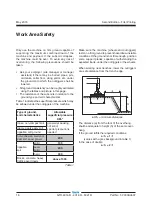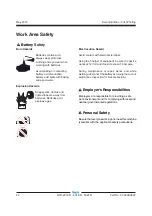
May 2015
Second Edition - First Printing
Part No. 57.0009.0607 GTH-4016 R - 4018 R - 5021 R
17
Operators must assess the job site variables and
avoid exceeding the machine's (or operator's)
capabilities for terrain and conditions.
Fall Hazards
Always wear a seat belt when
operating the machine.
Always remain completely inside the cab when
operating the machine.
When getting in and out of the cab, face the machine,
use the steps and handrails provided and always
maintain three-point contact.
Do not use the steering wheel or any other controls
as handrails.
Do not allow riders on the machine
or forks.
Do not transport or lift personnel with
this machine unless it is equipped
with an approved work platform.
Traveling on Slopes Hazards
When driving, keep the boom at
or below horizontal and keep the
load close to the ground.
When the machine is unloaded, travel with the forks
or attachment downhill.
When the machine is loaded and on transfer mode
(boom fully lowered and retracted):
•
max inclination driving downhill 9°
•
max inclination driving uphill 20°
•
max lateral inclination ± 5°
On steep terrain, drive only up and down a hill, and
always keep the machine in gear. Do not turn across
the slope when the machine is traveling up or down
a slope.
Limit travel path and speed according to the condition
of the ground surface, traction, slope, location of
personnel and any other factors which may create
a hazard. Never drive the machine unless the mast
and equipment are in their proper travel position.
Whether a machine will tip over during dynamic
machine operation involves many factors that need
to be considered. Among these are pavement/ground
conditions, stability and slope, as well as machine
equipment, operator skill, load position, tire inflation,
machine speed, etc.
Additionally, tip-over of a machine is dependent in
large part upon operator inputs such as the speed
and smoothness of the operation, as well as the
position of the attachment and its load.
Construction sites and roads will frequently change
slope from place to place, can be hard and soft, and
change due to construction activities and weather.
Operators should be properly trained and use their
best judgment and experience to take the necessary
precautions to prevent a tip-over.
Work Area Safety



































